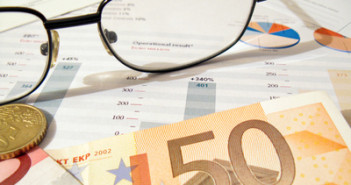Euro/dollar edged upwards after yesterday’s (May 9th) drop, but was still trading below the 1.30 level, as the political crisis in Greece continues. With some Greek politicians openly stating that the bailout package is null and void, the markets can be excused for being jittery. There are quite a few releases today, so the markets should be busy. There are three key releases today – US Trade Balance, US Unemployment Claims, and a speech by Federal Reserve Chairman Bernake.
Here’s an update on technicals, fundamentals and what’s going on in the markets.
EUR/USD Technicals
- Asian session: EUR/USD edged up to a high of 1.2956, and consolidated at 1.2950. The pair is unchanged in the European session, trading at 1.2947.
- Current range: 1.2945 to 1.30.

- Further levels in both directions: Below: 1.2873, 1.2760, 1.2660 and 1.2623.
- Above: 1.3050, 1.3110, 1.3165, 1.3212, 1.33, 1.34, 1.3437, 1.3486, 1.3550 and 1.3615.
- 1.30 continues to provide weak resistance to the pair.
- 1.2945 is being tested by the pair.
- 1.2873 is the next support level.
Euro/Dollar edging downwards – click on the graph to enlarge.
EUR/USD Fundamentals
- 6:45 French Industrial Production. Exp. -0.4%. Actual -0.9%.
- 6:45 French Gov Budget Balance. Actual -29.4B.
- 8:00 ECB Monthly Bulletin.
- 8:00Â Italian Industrial Production. Exp. 0.0%. Actual +0.5%.
- 12:30. US Trade Balance. Exp. -49.8B.
- 12:30 US Unemployment Claims. Exp. 371K.
- 12:30 US Import Prices. Exp. -0.1%.
- 1:30 Fed Chairman Bernanke Speaks.
- 14:30 US Natural Gas Storage. Exp. 33B.
- 17:00 US 10-y Bond Auction.
- 18:00 US Federal Budget Balance.
For more events later in the week, see the Euro/dollar
EUR/USD Sentiment
- Political deadlock continues in Greece: Greek voters spoke loudly and sent the government packing, but that was the easy part. What happens now? The inconclusive election results have resulted in a political stalemate, and so far no party has been able to cobble together a coalition. A leader from one of the leftists parties went so far as to state that the country’s commitment to the international rescue deal was null and void. The ECB and Germany are fuming, but they can do little more than plead for Greece to honor the bailout deal. Greece’s ability to stay in the Euro-zone is being questioned, and this could spell trouble for the Euro-zone and for the euro.
- French elections: The dramatic shift to the left in France promises to shake up the Euro-zone. President-elect Francois Hollande has already stated that he wants to renegotiate the euro zone fiscal pact in order to stimulate growth in the region, rather than resort to harsh austerity measures. The euro has tumbled since the election, and the trend could continue, as there are dire predictions that EUR/USD could eventually plummet to 1.20. The French election promises to mark a significant turn from austerity towards growth, perhaps a European Spring.
- Direction of US economy – anyone?: Mixed data out of the US this week continues to confound the markets. Consumer Credit jumped to its highest level in over four years, but Consumer Economic Optimism fell. Confusing? With the 2012 election campaign heating up, look for President Obama and Republican contender Romney to criss-cross the country painting very different pictures of the US economy. We may see some movement by EUR/USD, with key employment data being released later on Thursday.
- European recession deepening?: Weak Euro-zone releases and shock waves from the elections in Greece and France could prove a toxic mix for the euro. Spain is the latest euro-zone member to slip into recession, as it joins a host of other countries, including heavyweights Italy and the UK. The euro dropped sharply against the US dollar this week, and the slide could continue if the situation in Greece is not resolved quickly and effectively.
- Trouble in Spain: With the elections in France and Greece, Spain has not been the center of attention in the corridors of Berlin and Brussels. Of course, the serious problems affecting the country will not magically disappear, and Spain has the unenviable role of being the epicenter of the debt crisis. What will the EU do with the Euro-zone’s fourth largest economy? Greece is not a good model, as Spain is considered “too big too bailâ€. With a staggering unemployment rate of 24%, reform and growth will be no easy task.
- QE3 Move by Fed Unlikely: Fed Reserve Chairman Bernanke didn’t rule out QE3, and keeps declaring that “all options remain on the tableâ€.  As time passes by, however, QE seems quite unlikely. A “hands off†policy of low interest rates for the foreseeable future may not make for dramatic moves in market, but it is supportive for the greenback, which is enjoying a good run against the euro following the elections in France and Greece. We’ll see if Bernanke has anything interesting to add when he delivers a speech later on Thursday.



